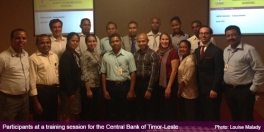Banking the Unbanked in Timor-Leste

By Federico Lupo-Pasini, UNSW
Jose is a poor farmer in the village of Maucatar in the mountains of Timor-Leste. Like most people outside the capital city, Jose grows some of the food for his family and relies on a meagre welfare cheque from the government. However, accessing this money is difficult. The nearest bank branch is a two-day walk from his village, and Jose can’t afford to lose those days of employment.
Timor-Leste is a poor country with a tumultuous political and social history and has only recently enjoyed a relatively stable period of development. The financial sector is underdeveloped and concentrated in the capital city, Dili. In the rural areas, where most people live, the economy is often based on barter with limited use of cash. Developing a financial sector able to deliver its services to the poorer parts of the population is fundamental to the broader development strategy of Timor-Leste. However, it is a big challenge. Banks have no interest in setting up branches in rural areas. The expenses would far exceed potential profits. The solution is to hire local agents, typically store keepers, to provide basic financial and payment services through the use of mobile phones. This is called “mobile banking or mobile money”.
A research team in UNSW Law, led by Scientia Professor Ross Buckley, has in the past two years become well-known internationally for its work on the regulation of mobile money. This project has been funded by a major grant from the Centre for International Finance and Regulation in Sydney (CIFR).
In October last year, this team was approached by the Central Bank of Timor-Leste to help design a regulatory framework for agent banking able to deliver financial services to all. This year researchers from Buckley’s team have flown to Dili to assist Central Bank officials in setting up a bank-led mobile money system in Timor-Leste. They have provided training to bank officials and other regulators, and advice on regulatory strategies adopted in other countries to “bank the unbanked”. This particular project is now being supported financially by the Asian Development Bank.
Part of the work has included visiting rural areas in the mountains. “When we got to the village, I was amazed by the level of poverty,” said Federico Lupo-Pasini, a UNSW research fellow. “However, if mobile banking takes off, life for these farmers will improve. They will be able to access a bank account without having to take a day or more off work and pay for the bus. They will have a way to save to pay for school for their children. I am very proud of what we are doing there, because you can really feel our work can have a direct and positive impact on the life of thousands of families.”
Ross Buckley shares his enthusiasm. “Right now mobile phones are the only reliable, efficient link between villages and the cities. The potential of mobile money to alleviate poverty in Timor Leste is substantial.”
Despite the goodwill of regulators, extending financial services to the poor in Timor-Leste is an uphill battle. Most people are still uncomfortable with the concept of digital money accessed through a mobile phone, as they are used to physical cash. Nonetheless, branchless banking represents a real opportunity to lift Timorese people out of poverty that must not be missed. UNSW Law is proud of its role in this endeavour.


Add new comment